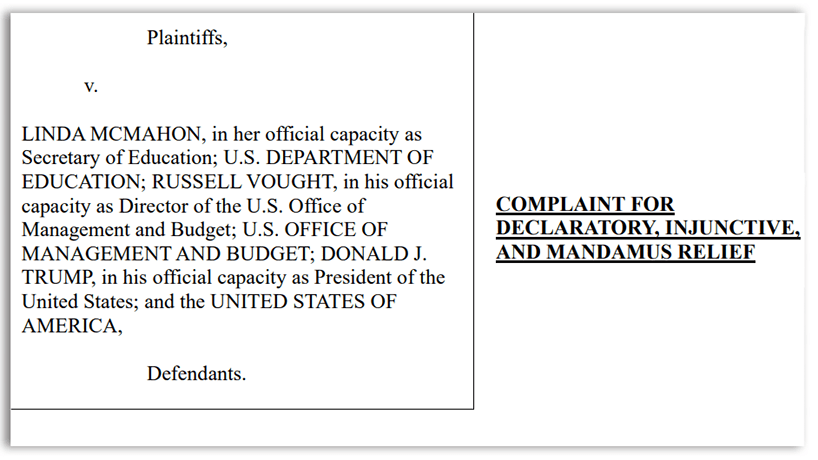On Monday, 24 states filed suit in federal district court in Rhode Island against the Department of Education, the Office of Management and Budget, and the President for failing to allocate more than $6 billion in fiscal year 2025 education funds on July 1. All of the states are led by Democrats. The suit’s subject is the continued withholding of allocations from the following programs: Migrant Education, English Language Acquisition, Professional Development, Afterschool Grants, Student Support and Academic Enrichment Grants, and Adult Education. The lawsuit seeks an injunction on the federal government’s funding freeze and the allocation of all funds to states. A hearing date and briefing schedule have not yet been set.
According to the suit, the federal government’s freeze violates multiple laws because “the act appropriating funding for these programs mandates that funding for these programs “shall become available on July 1” to Education Secretary Linda McMahon. ED’s regulations, in turn, provide that States ‘may begin to obligate funds on the date that the funds are first available for obligation by the Secretary.’ See 34 C.F.R. § 76.703(d). Read together, then, Congress and ED’s own regulations require that these funds become available for the States on July 1, 2025.”
The lawsuit argues that withholding these funds violates “multiple statutory and regulatory commands,” including:
- The authorizing statutes provide the government no discretion to withhold these funds to conduct a review
- The Antideficiency Act
- The Impoundment Control Act, “which places constraints on the Agency Defendants’ ability to choose not to spend appropriated formula funds”
- The Administrative Procedure Act, by failing to provide adequate justification for the review
- The Constitution’s separation of powers doctrine, as the legislative branch holds the power of the purse, and the Presentment Claus
The lawsuit makes the case that states have relied on receiving access to at least a portion of these federal funds on July 1 as far back as 1976 and that receipt of these funds months before the school year begins is crucial to their operation. It provides numerous of examples of state and district employees that would be laid off, programs that would be canceled and vendor contracts terminated if these funds were not allocated.








